Vladimir Petrovich Demikhov - the founder of world transplantology
The future famous scientist 18 was born on June 1916 of the year on the small farm Kuliki (today Kulikovsky farm on the territory of the modern Volgograd region) in an ordinary family of Russian peasants. Demikhov's father died during the Civil War, and his mother alone raised and raised three children, each of whom later received a higher education.
Initially, Vladimir Demikhov studied at the trade school for a mechanic-repairman. But in 1934, he entered the Moscow State University at the physiological department of the Faculty of Biology, beginning his scientific activity quite early. In the 1937 year, being a third-year student, Demikhov designed and made his own hands the world's first artificial heart, which was implanted in a dog. The dog lived with an artificial heart for two hours.
In 1940, the student Demikhov graduated with honors from Moscow State University and wrote his first scientific work. But a year later the Great Patriotic War began, which distracted him from scientific activity, the young scientist went to the front. From 1941 to 1945 year he served in the army. Since he had a biological, rather than a medical education, he got to the war not as a doctor, but as a pathologist. He graduated from military service in Manchuria with the rank of senior lieutenant of administrative service. In 1944, he was awarded the “For Military Merit” medal, at which time he was the senior laboratory assistant in the pathoanatomical laboratory. The work of pathologists was also important, as it could indicate the mistakes made by the surgeon and avoid their repetition in the future or indicate miscalculations in the treatment of wounded soldiers.
Immediately after the end of the war, Demikhov joined the Institute of Experimental and Clinical Surgery, where, despite the material and technical difficulties of the post-war years, he began to conduct truly unique operations. In 1946, he was the first in the world to perform a heterotopic heart transplant in the chest cavity in a dog and the first in the world to perform a heart-lung transplant in a dog. All this proved the possibility of such operations in the future and on a person. The following year, he conducted the world's first isolated lung transplant. Of the 94 dogs with transplanted hearts and lungs, seven lived from two to eight days. At the 1947 th All-Union Conference on Thoracic Surgery, which took place in 1, the scientist spoke about the methods of organ transplantation and showed a film in which a heart transplant was demonstrated. The report of Vladimir Demikhov at this conference was highly appreciated by the chairman - the well-known surgeon A.N. Bakulev, who evaluated Demikhov's experiments as “a great achievement of Soviet surgery and medicine”.
And in 1950, Demikhov won the NN Burdenko Prize, which was awarded by the Academy of Medical Sciences of the USSR. The first post-war years were in the meantime, when the work of a scientist was recognized in the USSR, they were noticed by prominent medical specialists. Vladimir Petrovich continued his medical experiments, giving himself up to work completely. He worked three types of operations: transplanting a second heart with its parallel connection to the circulatory system; second heart transplant with one lung; transplantation of a second heart with a gastro-atrial anastomosis. In addition, he finally developed methods for the complete simultaneous replacement of the heart and lungs together.
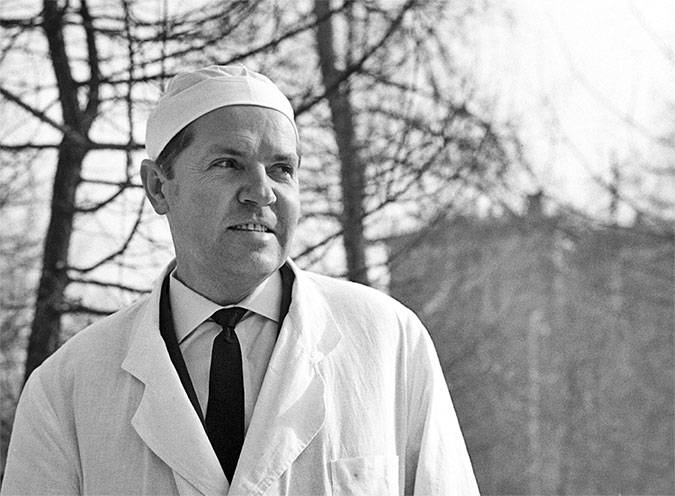
In 1951, at the session of the USSR Academy of Medical Sciences, which was held in Ryazan, Demikhov transplanted donor heart and lungs to Damke's dog, who lived 7 days. This was the first case in world medicine, when a dog with a strange heart lived for so long. It is reported that she walked in the lobby of the same building where the session was held, and felt pretty good. She did not die from the effects of a heart transplant, but from damage to the larynx that was inadvertently caused to her during the operation. In the same year, Vladimir Petrovich presented a fairly perfect heart prosthesis, which worked from a pneumatic actuator and conducted the world's first replacement for a donor heart without using an artificial blood circulation apparatus.
In 1952-53, Vladimir Petrovich developed the mammary-coronary bypass method. During his experiments, he tried to suture the internal thoracic artery into the coronary artery below the site of its defeat. The first time he did a similar operation on a dog in 1952, it ended in failure. Only a year later he managed to cope with the main obstacle that arose when a shunt was applied, a lack of time. The work needed to be carried out with the heart stopped, so the time for shunting was extremely limited - no more than two minutes. In order to connect the arteries during the mammary-coronary bypass surgery, Demikhov used tantalum clips and plastic cannulas. The results of the experiments summed up later. Of the 15 operated dogs that underwent surgery, three lived for more than two years, one for more than three years. This indicated the feasibility of such an intervention. In the future, this method will begin to be widely applied in clinical practice across the globe.
In 1954, Vladimir Demikhov developed a head transplant with the forelimbs from a puppy around the neck of an adult dog. He managed to put this operation into practice. Both heads breathed, at the same time lacquered milk from a bowl, played. These unique moments hit the film. In total for 15 years, Demikhov created twenty two-headed dogs, however, none of them lived for a long time, animals died due to tissue rejection, the record was one month. The color documentary “On the head transplant of a dog in an experiment” was shown in 1956 at the USSR International Exhibition in the USA. This film contributed to the fact that Demikhov was talked about all over the world. The purpose of these experiments was to learn how to transplant internal organs with minimal damage. After all vessels were stitched, general circulation was created, the transplanted head began to live.
These experimental operations forced the world community to speak of Demikhov as one of the greatest surgeons of modern times, but in his homeland he was literally anathematized. Officials from Soviet medicine did not even want to hear that the goal of unusual experiments was to test in practice the possibility of saving a sick person with the help of his temporary “connection” to the blood system of a healthy person. Opponents of the scientist became more and more aggressive, it went so far that one of his experimental dogs was simply killed.
Academician V.V. Kovanov, who was the director of the Sechenov 1 Medical Institute, where Vladimir Petrovich worked for some time, called the latter “pseudoscientist and charlatan”. NN Blokhin, who was the president of the Academy of Medical Sciences, believed that "this man is just an“ interesting experimenter. " Many believed that the very idea of transplanting a person’s heart, which the scientist ardently defended and strongly advocated was immoral. In addition, the great surgeon did not have a medical education, which gave many an extra reason to blame him for the frivolity of the research.
At the same time, prominent physicians from Czechoslovakia, the German Democratic Republic, Great Britain and even the United States came to the Soviet Union only to personally attend the operations conducted by the Master. He was sent numerous invitations to symposiums that were held in the United States and Europe, but were released abroad only once. In 1958, he went to a symposium on transplantology, which was held in Munich, his speech then made a sensation. But officials from the USSR Ministry of Public Health considered that he was disclosing secret Soviet medical research, so they didn’t let out more abroad. The situation was reminiscent of a bad anecdote, while the current Minister of Health called Demikhov's transplantology experiments unscientific, harmful and charlatan, the same officials of the Ministry of Health accused him of divulging state secrets during a speech in Munich.
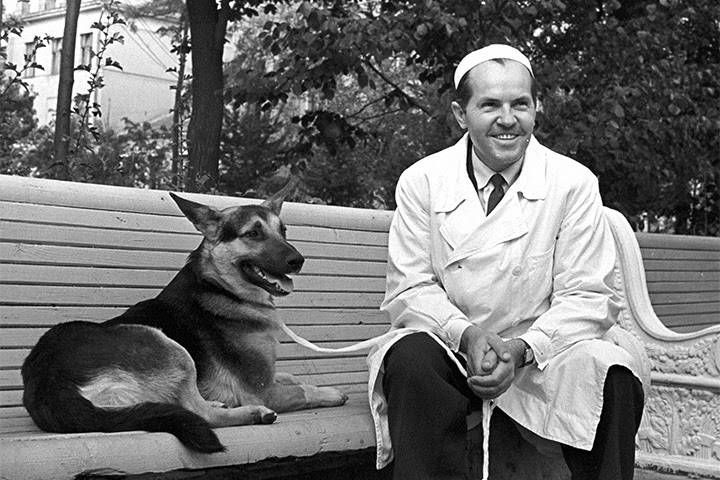
In 1, the IM Sechenov Moscow Medical Institute Demikhov worked from 1955 to 1960 for a year, after which, due to worsening relations with the institute director Vladimir Kovanov, he did not allow his thesis to be defended under the title “Transplant of vital organs in the experiment ”, Was forced to go to work at the Sklifosovsky Institute of Emergency Care. This thesis was issued in a shortened version of the monograph with the same name. At that time, it was the only guide in the world on the transplantation of organs and tissues. The work was quickly transferred to several foreign languages and presented in Berlin, New York and Madrid, causing genuine interest, and Demikhov himself became a recognized authority in this field in international circles, but not in the USSR. Only in the 1963 year with scandals that undermined his health, did he manage to defend himself. In one day, he managed to defend two dissertations (Ph.D. and Ph.D.), going from Candidate to Doctor of Biological Sciences in just 1,5 hours.
At the Sklifosovsky Institute of Emergency Care, a “laboratory for the transplantation of vital organs” was opened for the Master. But in reality, it was a pitiful sight - a room in 15 square meters, located in the basement of the outhouse. Dampness, cold and poor lighting in the kit. According to the memoirs of the students of Demikhov, they literally walked on the boards under which dirty water squished. The operations were carried out under the illumination of an ordinary light bulb. There was also no equipment, instead of a compressor — an old vacuum cleaner, a home-made artificial respirator and often a broken old cardiograph. There was no room for the maintenance of the operated animals, so the dogs involved in the experiments, the scientist took to his home, where he cared for them after operations. Later, 1,5 rooms were allocated for the laboratory, which were located on the first floor of the outbuilding. In such conditions, the laboratory under the leadership of Vladimir Petrovich worked up to the 1986 year. It developed various techniques for transplanting limbs, head, liver, adrenal glands with kidney, the results of the experiments were published in scientific journals.
Twice in 1960 and 1963 years, South African surgeon Christian Barnard came to Vladimir Demikhov for an internship. In 1967, he performed the world's first heart transplant from person to person in the world, writing his name in history. Barnard himself until the end of his life considered Demikhov his teacher, without communicating with him, studying his works and personal meetings, he would never have decided on his own historical experiment. But in the Soviet Union, the first successful heart transplantation was performed only on 12 March 1987 of the year, the operation was performed by an honored surgeon, academician Valery Shumakov.
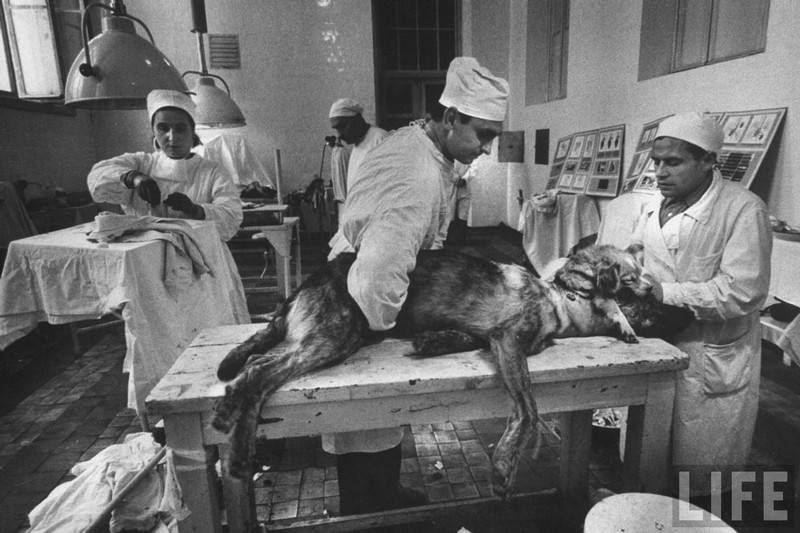
Demikhov's work, the results he achieved and the written scientific works brought him real international recognition. He was an honorary member of the Royal Scientific Society in Uppsala (Sweden), an honorary doctor of medicine at the University of Leipzig, as well as the University of Hannover, the American Mayo Clinic. Vladimir Demikhov was the owner of numerous honorary diplomas of scientific organizations representing various countries of the world. In 2003, he was posthumously awarded the Golden Hippocrates International Award.
Despite foreign recognition, the last years of Vladimir Demikhov’s life in Russia were almost completely forgotten in a small one-room apartment in Moscow. Her furnishings were only old furniture. Even the local doctor who visited the ailing Demikhov was amazed at the poverty and spartan conditions of the apartment of the doctor of biological sciences and the famous scientist. In recent years, Demikhov almost never left the house, because even earlier he began to lose memory. Once he went for a walk with his dog in the morning, and returned only late in the evening. Strangers brought him home, they found his apartment, since his daughter Olga had put a note in the pocket of his jacket with the address of residence the day before. After this incident, his family simply did not let him out on the street anymore.
It's a shame that the recognition of the works of Demikhov in his homeland passed later than abroad. Only in 1988, among other well-known Soviet specialists, was Vladimir Petrovich awarded the USSR State Prize "for achievements in the field of cardiac surgery." And in the 1998 year - already in the year of death - Demikhov was awarded the Order for Services to the Fatherland of the III degree, among other scientists he became the winner of the State Prize of the Russian Federation "for developing the heart transplant problem".
The great Russian experimental scientist, a great surgeon Vladimir Demikhov, passed away on November 22 1998, at the age of 82 years. On his grave at the Vagankovsky cemetery in Moscow, a monument was erected, at which is indicated the “founder of the transplantation of vital organs” In 2016, in the year of the centenary of birth, a full-fledged monument was finally opened to him. It was installed near the new building of the Research Institute of Transplantology and artificial organs named after Shumakov. In the same year, the VIII All-Russian Transplant Congress with international participation was held, which was devoted to the 100 anniversary of the birth of the Master. Then, at the initiative of the Russian Transplant Society, the 2016 year was declared the year of Vladimir Demihov. Truly, Russia is a country in which it is necessary to live long, and recognition sometimes comes only after death.
Information sources:
https://rg.ru/2016/06/27/v-moskve-otkryli-pamiatnik-osnovateliu-transplantologii-vladimiru-demihovu.html
http://ehorussia.com/new/node/14668
http://rufact.org/wiki/Демихов%20Владимир%20Петрович
Open source materials
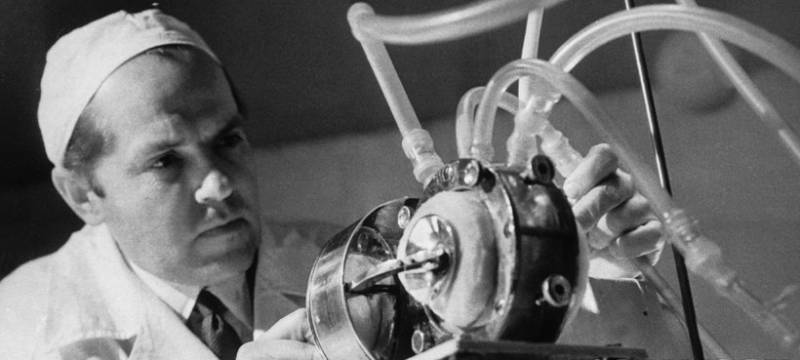
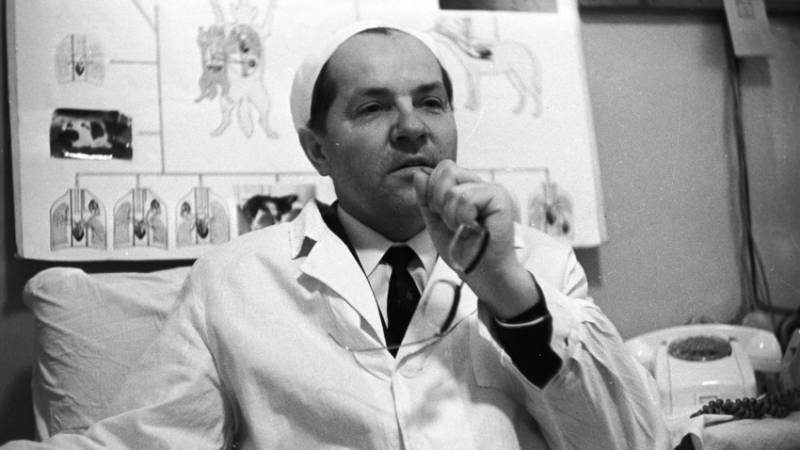
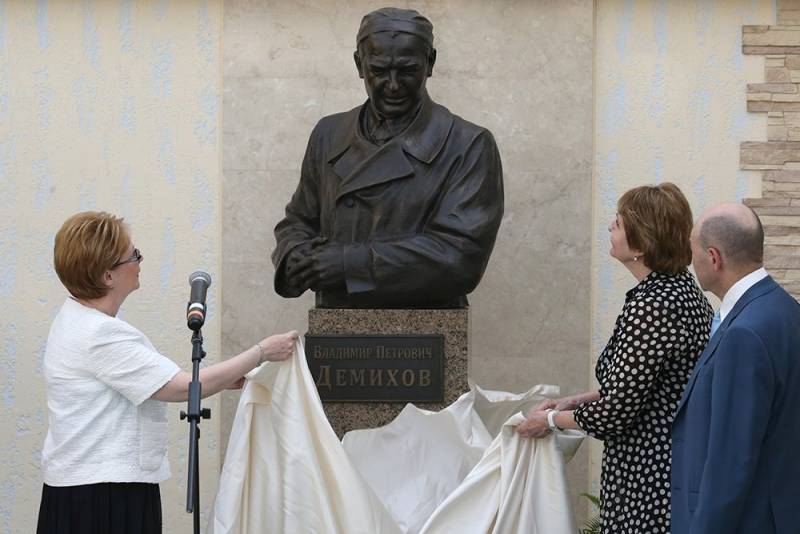
Information